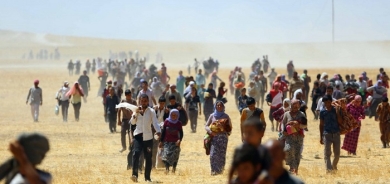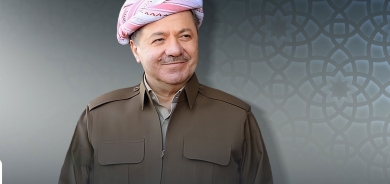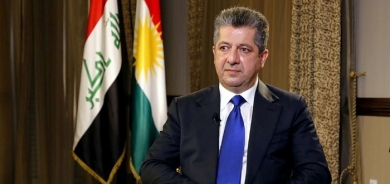Sami Moubayed to Gulan: What they [the Turks] have leaked to the world about a federal democracy in Syria is farce.
August 20, 2013
Exclusive Interviews
![Sami Moubayed to Gulan: What they [the Turks] have leaked to the world about a federal democracy in Syria is farce.](https://www.gulanmedia.com/public/old_images/t_dimana/78.gif )
Sami Moubayed is a Syrian historian and political analyst, who now works at the Carnegie Middle East Center in Beirut, Lebanon. In 2006-2012 Moubayed served as editor-in-chief of Forward Magazine, Syria's premier English publication, and still serves as Vice-President of Haykal Media, the publisher of Forward. His articles on Middle East affairs have appeared in a variety of newspapers, including al-Ahram Weekly, al-Hayat, Gulf News, The Daily Star, Washington Report on Middle East Affairs, and Asia Times. He is a blogger with The Huffington Post and an online panelist with The Washington Post.An Interview with Sami Moubayed
Sami Moubayed to Gulan: What they [the Turks] have leaked to the world about a federal democracy in Syria is farce.
All the reports on the Syrian conflict indicate that its situation is going to be worse and more critical. And the reason is that the regime in Syria is becoming stronger and achieves some sort of progress in terms of military operation. However, as the GCC decided to arm the Syrian opposition, this means that there are more weapons flowing into the country and as a result the conflict is going to be bloodier and more tragic. To further investigate into these issues, here is an interview with Sami Moubayed a Syrian historian and political analyst at the Carnegie Middle East Center in Beirut.
Gulan: Although Syrian situation has become an international issue, currently Assad's army is about to re-take control of some territories in Syria, and thus the situation is becoming much bloodier. How do you read the situation in Syria as a huge humanitarian disaster is taking place?
Moubayed: I think that the death toll is far greater than what has been fixed by the UN. I would confidently put it at above 200,000 Syrians dead. Both sides try to downplay the number, to raise the moral of their fighters. If the real numbers were revealed, it would result in a major collapse of fighting spirit. Back in July 2012, Syrian TV stopped mentioning names and numbers of men-in-uniform killed. However, no less than 30 troops are killed per day. Also don’t forget that many of the missing, or arrested, have also died. We still don’t know where they are. It is the worst human disaster to befall Syria since the famine, mass death toll, and hunger gripped the country during World War I. It is a human tragedy indeed.
Gulan: Syrian opposition is unable to organize themselves, and since the world is concerned about Al-Qaeda, the opposition is not supported completely. In your view, to what extent will Syria’s becoming a shelter for Al-Qaeda organization further darken the future of Syria and the Area?
Moubayed: Two years ago, the regime was the first to say that al-Qaeda was operating in Syria. Back then, I don’t think it was. Civil activists and the opposition cried foul play, insisting that there was no room for al-Qaeda in Syria. That argument is not true for Syria 2013. It is no secret that al-Qaeda found its way into the Syrian battlefield. It’s a hard fact acknowledged by the regime, the opposition, and the stakeholders in Syria itself. Additionally, al-Qaeda has publically stated, via Ayman al-Zawahiri, that it is now in the Syrian theatre and its proxy is Abu Mohammad al-Baghdadi, commander of the al-Qaeda branch in Iraq. But this is only natural when the conflict drags on for so long; the ground becomes attractive for radicals from all kinds. Syrian jihadists will get absorbed into society once the guns silence. But what to do with the foreign jihadists operating in Syria? We don’t have an accurate number. Some people say ‘not many.’ Perhaps, but they are noisiest and most well trained and armed of the military groups. I don’t see a future for them once a deal is hammered out, either at Geneva II (if it ever happens) or elsewhere. Society will quarantine and eventually expel them. Syria has always been a place of co-existence and moderate Sunni Islam. This was not born yesterday it is deep rooted in history. What is happening in Syria today is the exception, not the norm.
Gulan: As Syrian Kurds have rescued their territory recently, they've been attacked by Al-Nusra front. According to the news, currently Al-Nusra front is mass murdering Kurds, and kills women and children. The question in here is: why are the Kurds mass murdered, rather than trying to benefit from their power?
Moubayed: The recent battles between al-Nusra Front and Syrian Kurds have suddenly attracted the entire world’s attention. It is not new and has been dragged on for some time now. Again, it’s only natural. Don’t forget that radicals in the opposition are upset with the Kurds for having been too moderate since the revolt started in March 2011. They were expecting the fiercest battles in the Kurdish districts given Kurds’ decade long hostility with the Baathist regime. Because of the strong backing of Recep Tayyip Erdogan, however, the Kurds stood at arms-length from the opposition. They didn’t want to be part of any group that was backed by Turkey. You have to understand the history behind that. Schools, autonomy, language, and culture were on their mind, more than armed uprising and Turkish-imposed change. They have no carved out a de facto Kurdish pocket in the northeastern province of Syria. The Islamists are not happy because this leaves them in northern Syria facing the Free Syrian Army (FSA). The regime forces are nowhere to be found in these territories and in a real battle, the FSA will win, on the long run. The Islamists feel abandoned by the Kurds while the Kurds feel that the Islamists diverted the civil movement that started in 2011, hijacked its principles, distorted it, and played out in favour of regime sustainability. After all, the world began to reconsider what kind of future it wanted for Syria after the Islamic trends began to show strongly in the Syrian Opposition.
Gulan: Mr. Barzani, president of Kurdistan region, is currently holding Kurdish conference in Erbil, and is about to gather Kurdish parties from all four fractions of Kurdistan so as to deal with situation of Kurds in all four parts. The question in here is to what extent will Kurdish conference in Erbil become a new understanding for resolving Kurdish question in the area?
Moubayed: President Barzani came out with a very interesting and powerful statement a few days back, saying that he will not stand by and watch as Kurds are massacred in Syria. He has the means, the money, and the manpower to put his words into action. I think we are at a tipping point here. Kurds will side with Kurds. It’s that simple. They will jump into action and take risks to protect their Kurdish brothers. This is how they have been throughout history. This is a lifetime opportunity for them; if they don’t grab it again, it might never come again.
Gulan: Regarding mass murdering Kurdish people in Syria, president Barzani has asked the Kurdish conference to send a delegation in order to know the statistics of the Mass Murdering in which Al-Qaeda has performed against Kurds in Syria, if results show that Kurdish people in there have been mass murdered, to what extent international community will be supporting Kurds in order to stop this?
Moubayed: Well, the Kurds, through Saleh Mussallam (PYD) have already received the backing of the Turks and the Iranians for their aspirations. The regime has been silent. It has neither opposed nor supported all talk of creating Western Kurdistan, with its capital in al-Qamishly. I don’t think the Turks will ever allow it. What they have leaked to the world about a federal democracy in Syria is farce. It would just heighten the ambitions of Turkish Kurds, who claim that 55% of historic Kurdistan is in modern Turkey. However, the talks underway between PYD and the Turks are very important. First, they are public. Second, they are at the official invitation of the Turkish Foreign Ministry, whereas in the past, such talks were held strictly through intelligence and security channels. Third, it’s almost as if the Turkish government is talking now to the PKK. History is being made and lived. To what extent will it stand; that’s a different story.
Gulan: Barzani has also mentioned that we will not let any country to genocide Kurds ever again, which means Barzani may send Peshmarga forces to Syria, if Barzani is forced to send Kurdish army to Syria in order to protect Kurds, to what extent will the equation change, and will further forces enter the situation?
Moubayed: Such a move cannot be unilateral. It has to be approved by the Syrians, the Turks, the Iraqis, and of course, the stakeholders, namely the United States. Who would mandate their entry? On what legal grounds? Legally, this would be called an invasion, unless the Syrians allow it to help them eliminate the Islamists. Kurdistan, on paper and according to the United States and the Arab League, is still considered officially a part of the Syrian Republic.
Gulan: Protecting the territories that are run by Kurds currently in Syria is important for the future of that country. In your opinion; to what extent is it important to create a process, like "Provide Comfort" which was created for the Kurds during 1990s in Iraq, for the Syrian Kurds also?
Moubayed: Previously, Syrian Kurds were saying that passports, culture, and language were on their mind, rather than autonomy. But people evolve, and so do projects and ideas. I think that this is a natural outcome of the breakdown of the state in the northern and eastern parts of Syria. These borders are less than 100 years old. In human history, 100 years almost don’t count. They are artificial to start out with, having been enforced on everybody, Arabs and Kurds, by the British and the French. Syrian nationalists refuse such a partition. They want to see Syria forever united. I am not sure that can be achieved, at least not on the short term. There is too much blood now. An Alawite from Tartous cannot live with an Islamist from Idlib, and a Christian from Aleppo cannot live with a fundamentalist from Jisr al-Shughour. A Kurd from al-Hassake cannot live with an Islamist from Jabal al-Zawiya. The Kurds have made use of this situation and are steering it into the direction that best fits their interests.
Gulan: Don't you think that creation of a safe haven for Kurds will become a reason for gathering opposition forces for toppling Assad’s regime?
Moubayed: The opposition, on paper, remains committed to that, but it is becoming increasingly difficult to imagine a clear cut victory for any side. With this kind of military warfare and assistance from the West, the regime is not going to fall. The regime after all, is gaining ground on around 45% of the country (the entire southern part) which comprises nearly 60% of the population. Homs has been re-taken by the regime. Damascus proper, Tartous and Latakia are still strongholds of the regime. The same cannot be said of the Damascus countryside, but there are battle outcomes that will decide the fate of those towns and villages. The regime has a high chance of re-taking them. The Iranians would be happy with such a scenario, because it means that the Damascus-Beirut highway is safe, and so would the Russians, who would see the regime surviving in Damascus and its military base in Tartous, safe and sound. The Israelis would never tolerate Islamists on their border with Syria. They have already said that chemical weapons with a strong regime are okay. Chemical weapons with a weak regime are problematic. Chemical weapons with the Islamists are a red line that they will never allow. Neither the Israelis, nor the Russians, and certainly not the Iranians really care who runs Daraa or Idlib. The Americans have said time and again that they want Assad to leave but have provided no road map as to how and when this should happen. The Russians are seemingly more committed to keeping Assad than the Americans are at removing him. Regimes don’t fall in 18 days. Husni Mubarak was an exception. It was the army that brought him down, using pretext of the popular revolution. The opposition really felt that Assad will fall in a matter of weeks. In as much as Egypt was inspirational, it was also a grand illusion. Just look at Egypt today. And Libya was more of a delusion, where many thought that the minute the regime responds, NATO is going to step in.















